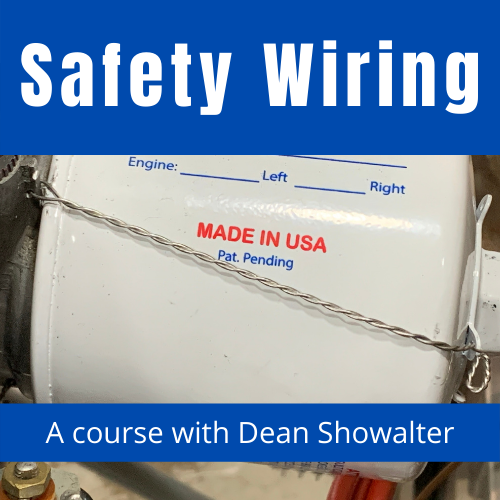Podcast: Play in new window | Download
Cable tensions are a really important part of an airplane’s flight control system. In today’s podcast, we’ll talk about the situation I faced recently on a V-tail Bonanza.
I want to say a BIG THANK YOU to those who have purchased the “Safety Wire Like A Pro!” video tutorial course.
And for those who are still thinking about it, this is a great way to hone your safety wiring skills. You can read about it here and decide if it’s a good option for you:
Here’s what Bruce, the owner of a K35 Bonanza had to say about the course:
“I love the safety wiring course! Nice going. The first two videos alone
are worth the purchase price. Watching you rewire the A36 Bonanza drain
plug was perfect– I feel like I understand much more now about how to do
the wiring I need to on my Be-k35. I’ve watched the first 5 already and
I love the pictures, specific guidance and your commentary.
This is a great contribution to my quest to be a safe owner. Thanks very
much. I’m glad you decided to do these.”
A couple of tips from today’s episode:
- Always do an extra thorough preflight inspection after any maintenance work is done.
- Design a custom-made hardware box for your airplane. The owner of a Mooney M20J made one with a simple plastic divider box. It works very well, and is one way to make the annual inspection process a bit more efficient.
Now for today’s feature: control cable tensions.
The V-tail Bonanza has a complex differential mechanism in the tail, that makes everything function and move properly. It’s important that everything be rigged and adjusted properly, in order for all the control surfaces to do their job. During a recent annual inspection, I noticed that all the control cables needed some tightening, to get them in the maintenance manual specs. I was considering having the owner take the airplane to a shop where they “specialize” in that type of work, but after a couple phone calls and talking with the owner, I discovered that the best option was to just go ahead and do it in our shop.
I think the biggest thing that needed to change about the whole process, was my thinking. I was asking the wrong question. I was asking, “Can I do this task?” I should have been asking, “How will I do this task?”
Over the years, I’ve done a lot of flight control rigging, and cable tension adjusting. It’s just that the V-tail Bonanza is a little more complex than most. So it deserves some special attention to ensure everything is correct.
Listen to today’s episode to find out how all the flight control cable tensions were set in a way that did not change the rigging of those tail surfaces, and in the case of the ailerons, actually improved the rigging in a very simple way.
This situation reminds me of the importance of making some observations BEFORE getting started on cable tension adjustments. Here are a few questions that might help:
- Do all controls contact the stops?
- Do controls align properly?
- If any controls do not align properly, can that situation be improved while tightening cables?
So that’s my latest story of control cable tensions – very important to have all tensions and travels in the maintenance manual specs.
As I think through that whole situation, Here are some thoughts I have now, that I hope might help you, as you think about YOUR airplane.
- If you’re not sure about your control cable tensions, have them verified at the next annual.
- BUT, make sure you’re dealing with an A&P you trust.
- These kinds of situations can get out of control quickly.
- Think about the big picture and check all positions before getting started.
- Take notes… don’t rely on memory!
- Record all changes made… how much you tightened each turnbuckle. (Just in case you need to go back to where you started from.)
- Safety all turnbuckles.
- Verify full and proper operation of all control systems.
- Document work in detail… I prefer to list mm specs in log entry…. this can be helpful in the future.
- Have a test flight done.
Hope that’s helpful as you think about your airplane… I’m very sure there are a lot of airplanes flying around out there with cable tensions that are below specs. You might want to get yours checked out at the next annual inspection.
Have a great week, and don’t forget to check out the safety wiring video course. Here’s one more note from Bruce after he finished the course:
Last weekend, I completed the safety wiring course. Outstanding!! I feel much more confident now in doing my oil filter.
Get all the details here:
Safety wiring video tutorial course.


Recent Comments